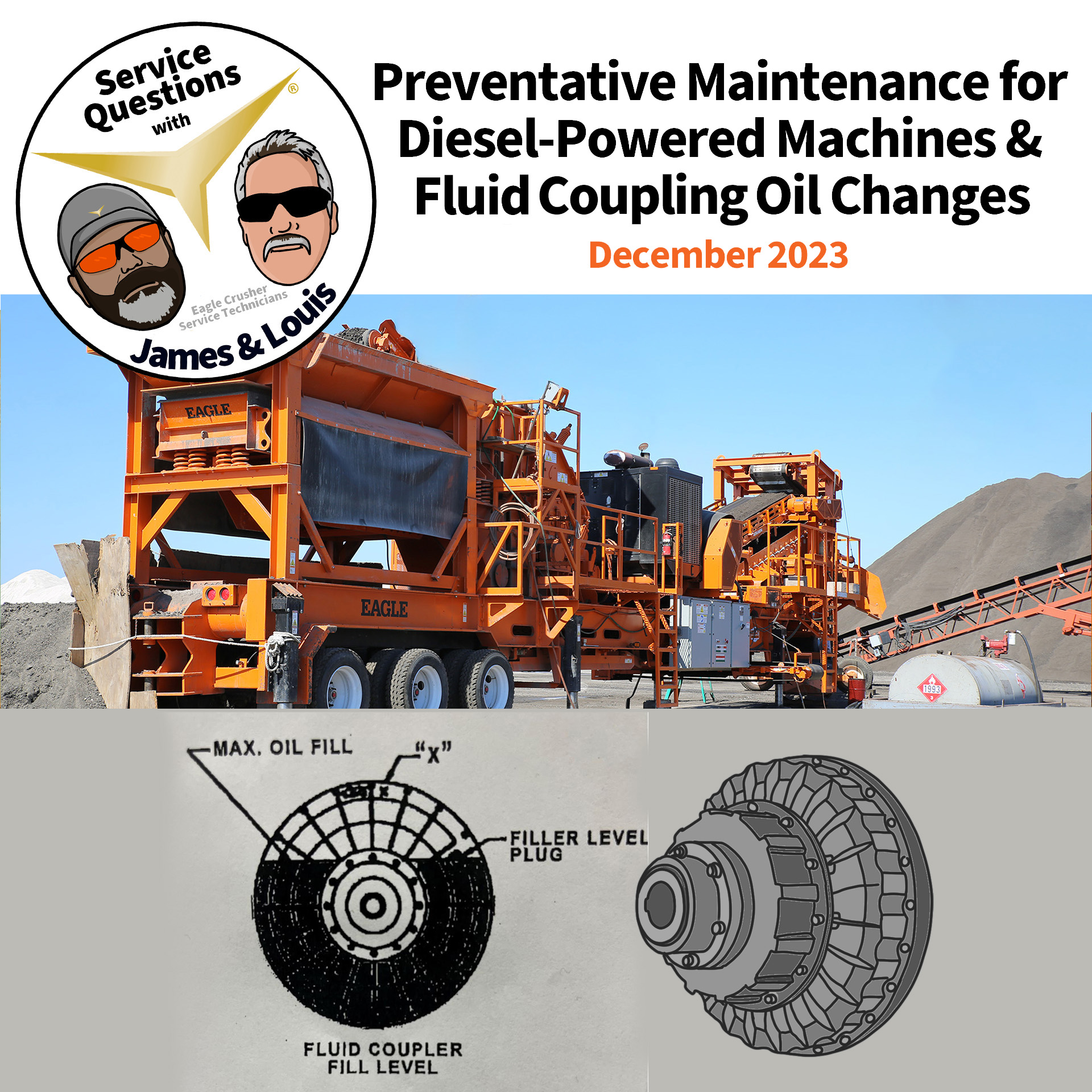Service Questions with James & Louis: Preventative Maintenance for Diesel-Powered Machines & Fluid Coupling Oil Changes
In the fast-paced schedules of our daily lives, it’s easy to overlook the importance of preventative maintenance. Just as we prioritize our health through regular exercise and check-ups, our machines also require proactive care to ensure their longevity and optimal performance. This guide aims to unravel the mysteries of preventative maintenance, offering guidance, tips, and a helping hand to empower you in taking charge of the well-being of your crushers. So, let’s embark on this journey together, and learn about the preventative maintenance for the diesel-powered machines and changing the fluid coupling oil.
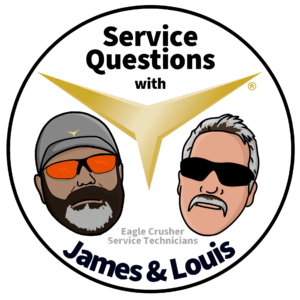
Question: What does a daily and weekly maintenance schedule for my diesel-powered machine look like?
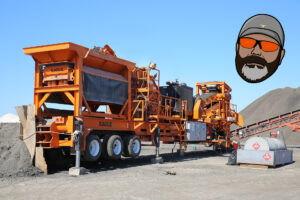
Service: To ensure your diesel-powered crushing plant is operating at full capacity and to preserve its lifespan, perform the daily and weekly maintenance using the proper lubrication and oils recommended by Eagle Crusher and component manufacturers. This guide will go over some of the recommended daily and weekly preventative maintenances for the Eagle Crusher 1200-25CC so make sure you refer to your owner’s manual for accurate information regarding your machine.
Daily Maintenance:
1: Check diesel engine oil and coolant for proper level. Fill as needed.
2: Check oil in vibrating feeder and screen using sight glass indicators. Oil should be halfway in sight glass. If either is low before filling, make sure your 1200-25cc has not shifted and has become unlevel. If your plant is level and still showing low in your sight glass fill till oil is halfway in sight glass.
3: Inspect the air filter element(s) for dust accumulation. Replace elements with new as necessary. Do not reuse air filters. Used air filters can result in equipment damage and/or void of your warranty.
4: Visually inspect all sections of your 1200-25cc. Check for any leakage of lubricants or other fluids. Check for loose bolts. Pay close attention while your plant is operating for abnormal noises or odors.
5: Visually inspect all conveyor belts for holes, cuts, or tears. Repair belt as needed.
6: Open your impactor lid daily and check blow bar, curtain liners, housing side liners for wear. Replace any excessively worn, broken or damaged liners immediately. Running your UM-25 with worn, broken or missing wear liners/blow bars will damage the equipment and may void factory warranty. If you need any wear liners or blow bars, reach out to our part department (link) to make sure you get genuine repair parts.
7: Check all guarding. Replace any missing guarding. Repair or replace any damaged guarding.
8: Make sure all catwalks are clear of materials. Make sure there is no build of material slowing the motion of the feeder or screen. If your plant is equipped with grizzly bars, check that they are clear to ensure your machine is filtering out properly sized material to lessen the wear in your impactor.
9: Check the hopper section that is located inside your feeder to ensure that your hopper did not shift causing feeder to rub against hopper. This will slow your feed and could cause failures to both hopper and feeder. Adjust so you have equal gaps on each side.
10: Check all belt tensions. You will find a belt tension guide in your owner’s manual.
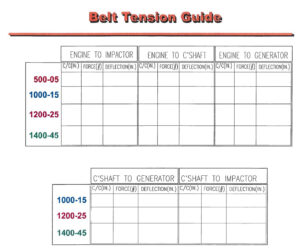
An example of a belt tension guide in your owner’s manual.
If you have any questions about the recommended daily maintenance, reach out to us and we’ll walk you through it.
Weekly Maintenance:
1: Inspect all V-belts for proper adjustment. Check belts for any wearing and adjust and/or replace as needed.
2: Use a compressed air cleaning hose to blow dirt and/or dust out of radiator fins on your diesel engine. This is important to not restrict airflow to your engine. Pay close attention to not damage radar fins.
2: Lubricate your 1200-25cc by following the chart provided in your owner’s manual.
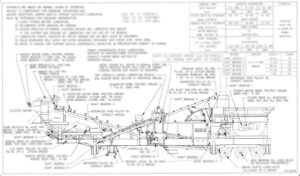
Example of a lubrication chart found in the owner’s manual.
Q: Are there any special procedures after my initial break-in period?
S: The following procedures only need to be performed after a specified number of break-in hours for the components when the plant is new or after components have been replaced. Check the owner’s manual for all information regarding your specific machine.
1: Diesel Engine- if your 1200-25cc has a new John Deere engine you will need to change the oil after the first 100 hours of operation. John Deere puts break-in oil in their diesel engine’s they provide to Eagle Crusher.
2: Check all electrical connections on your 1200-25cc after 80 hours. Take special care to check the connection cables on the generator.
3: The hydraulic power unit engine oil must be changed after the first 20 hours of operation.
4: The magnet separator conveyor belt drive speed reducer oil must be changed after the first 150 hours of operation.
Q: What should I do if I have more questions about preventative maintenance on my diesel-powered machine?
S: We’re always a phone call or email away! Reach out to service and we’ll work with you to get the proper preventative maintenance schedule set up.
Question: How do I change my fluid coupling oil?
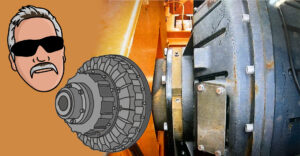
Service: With all oil changes, you start off by lock out / tag out the machine. First, you want to remove the used oil. To do that, start by removing the fusible plug and rotating the coupling until the open plughole is directly at bottom. Allow all the oil to drain from coupling.
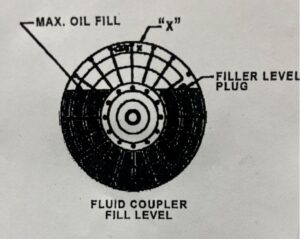
Before you replace the oil, make sure to return the fusible plug so that no oil drips out. Turn the coupling so that the “X” is at the top. This will ensure that the level plug is in the right direction. We recommend that you fill it with Phosphate Ester oil until the oil starts to overflow out of the filler hole.
Q: Do I need to worry about excess air in the oil?
S: While you fill the coupling with oil, rock it gently on its axis to ensure that excess air is vented.
Q: What should I do if the oil leaks?
S: To ensure no oil leaks during its operation, use thread sealant on the filler plug threads. If it continues to leak, give us a call and we’ll figure it out together.
As we conclude this exploration into some of the preventative maintenances to do on your Eagle Crusher machines, remember that knowledge is a powerful tool, but seeking guidance is equally valuable. Your journey toward a well-maintained and efficient environment doesn’t have to be a solitary one. If you find yourself with unanswered questions or uncertainties about the recommended maintenance practices discussed here, don’t hesitate to reach out to our well trained and eager to help service team.



